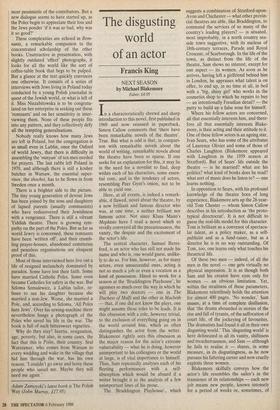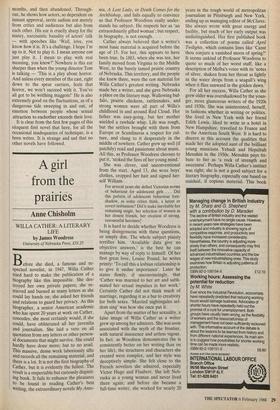The disgusting world of an actor
Francis King
NEXT SEASON by Michael Blakemore
Faber, f4.95
In a characteristically shrewd and sharp introduction to this novel, first published in 1969 and now reissued in paperback, Simon Callow comments that 'there have been remarkable novels of the theatre'. True. But what is odd is that, in compari- son with remarkable novels about the world of writing, remarkable novels about the theatre have been so sparse. If one seeks for an explanation for this, it may lie in the need for a novelist to find, deep within each of his characters, some essen- tial core, and in the tendency of actors, resembling Peer Gynt's onion, not to be able to yield one.
Here, at all events, is indeed a remark- able, if flawed, novel about the theatre, by a now brilliant and famous director who was, at one time, a neither brilliant nor famous actor. Not since Klaus Mann's Mephisto have I read a novel which so vividly conveyed all the precariousness, the vanity, the despair and the excitement of the actor's life.
The central character, Samuel Beres- ford, is an actor who has still not made his name and who is, one would guess, unlike- ly to do so. For him, however, as for many actors, even unsuccessful ones, acting is not so much a job or even a vocation as a kind of possession. Hired to work for a season at the 'Braddington Playhouse', he agonises so much over the way in which he will play two doctors — one in The Duchess of Malfi and the other in Macbeth — that, if one did not know the plays, one might assume these roles to be leads. It is this obsession with a role, however trivial, to the exclusion of everything going on in the world around him, which so often distinguishes the actor from the writer. Blakemore rightly sees this obsession as the major reason for the actor's extreme vulnerability — what he is doing, however unimportant to his colleagues or the world at large, is of vital importance to himself. Thus, Sam repeatedly analyses each of his fleeting performances with a self- absorption which would be absurd if a writer brought it to the analysis of a few unimportant lines of his prose.
The 'Braddington Playhouse', which suggests a combination of Stratford-upon- Avon and Chichester — what other provin- cial theatres are able, like Braddington, to command the services of so many of the country's leading players? — is situated, most improbably, in a north country sea- side town suggestive, with its nucleus of 18th-century terraces, Parade and Royal Crescent, of Scarborough. In the life of the town, as distinct from the life of the theatre, Sam shows no interest, except for one aspect — its women. As soon as he arrives, having left a girlfriend behind him in London, he appraises what talent is on offer, to end up, in no time at all, in bed with a 'big, shiny girl' who works in the cosmetics shop to which he repairs to buy — an intentionally Freudian detail? — the putty to build up a false nose for himself.
Where his fellow actors are concerned, all that essentially interests him, and there- fore all that essentially interests Blake- more, is their acting and their attitude to it. One of these fellow actors is an ageing star, Ivan Sears, who has some of the attributes of Laurence Olivier and some of those of Charles Laughton (Blakemore appeared with Laughton in the 1959 season at Stratford). But of Sears' life outside the theatre — is he married? what are his politics? what kind of books does he read? what sort of music does he listen to? — one learns nothing.
In opposition to Sears, with his profound knowledge of the theatre born of long experience, Blakemore sets up the 28-year- old Tom Chester — whom Simon Callow describes in his introduction as 'the proto- typical directocrat'. It is not difficult to guess the real-life model for this character. Tom is brilliant as a convenor of spectacu- lar talent, as a policy maker, as a self- publicist and as a fund-raiser, but as a director he is in no way outstanding. Of Tom, too, one learns only what touches his theatrical life.
Of these two men — indeed, of all the men in the novel — one gets virtually no physical impression. It is as though both Sam and his creator have eyes only for women — an obvious limitation. Yet, within the straitness of these parameters, Blakemore relentlessly holds the attention for almost 400 pages. `No wonder,' Sam muses, at a time of complete disillusion, that `the drama abounded in stories of the rise and fall of tyrants, of the suffocation of court life, of the jockeying of favourites. The dramatists had found it all in their own disgusting world.' This 'disgusting world' is here delineated in all its vanity, shiftiness and treacherousness, and Sam — although he fails to realise it — shares, in some measure, in its disgustingness, as he now pursues his faltering career and now cruelly exploits three women.
Blakemore skilfully conveys how the actor's life resembles the sailor's in the transience of its relationships — each new job means new people, known intensely for a period of weeks or, sometimes, of months, and then abandoned. Through- out, he shows how actors, so dependent on instant approval, invite sadism not merely from critics and audiences but also from each other. His ear is cruelly sharp for the matey, narcissistic banality of actors' talk — with speeches like 'Well, love, you know how it is. It's a challenge. I hope I'm up to it. Not to play it. I mean anyone can just play it. I mean to play with real meaning, you know?' Nowhere is this ear sharper than when the young director Tom is talking — 'This is a play about horror. And unless every member of the cast, right down to the spear carriers, feels that horror, we won't succeed with it. You've all got to be writhing maggots!' He is also extremely good on the fluctuations, as of a dangerous tide sweeping in and out, of emotion between people whose sexual attraction to eachother exceeds their love.
It is clear from the first few pages of this eloquent first novel that here, for all the occasional inadequacies of technique, is a born writer. It is strange and sad that no other novels have followed.



















































 Previous page
Previous page